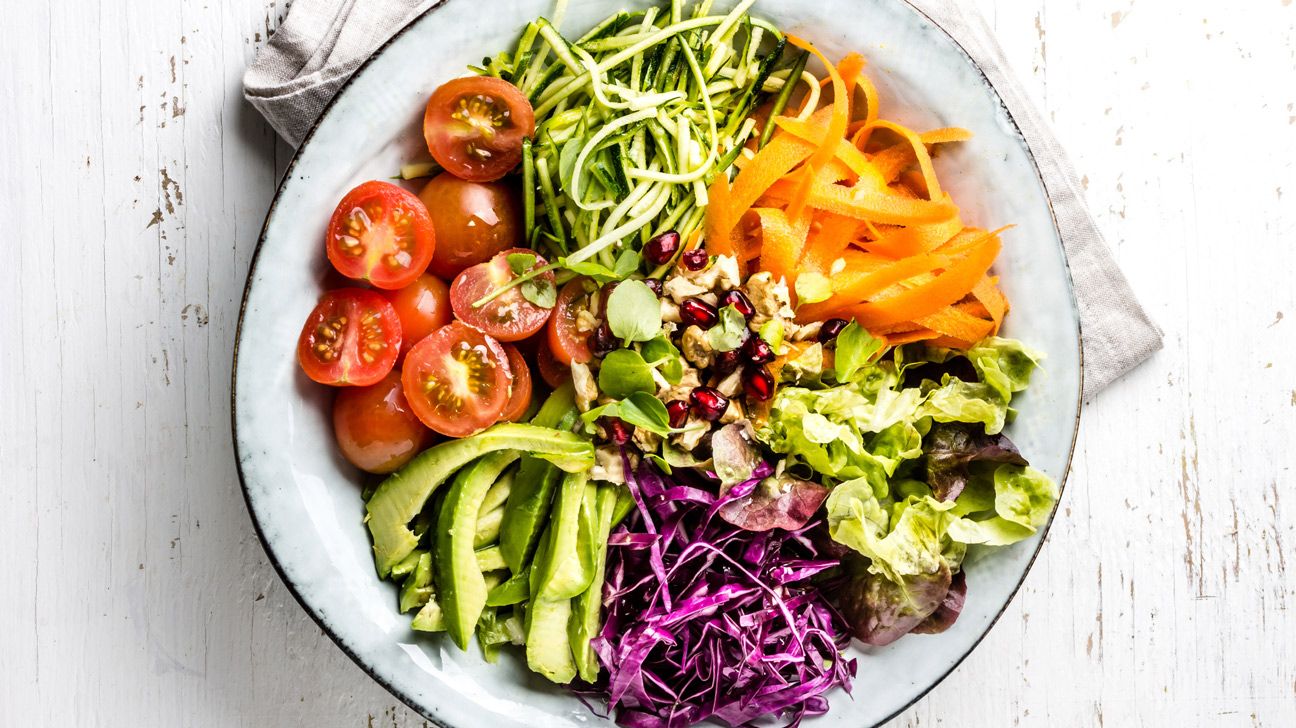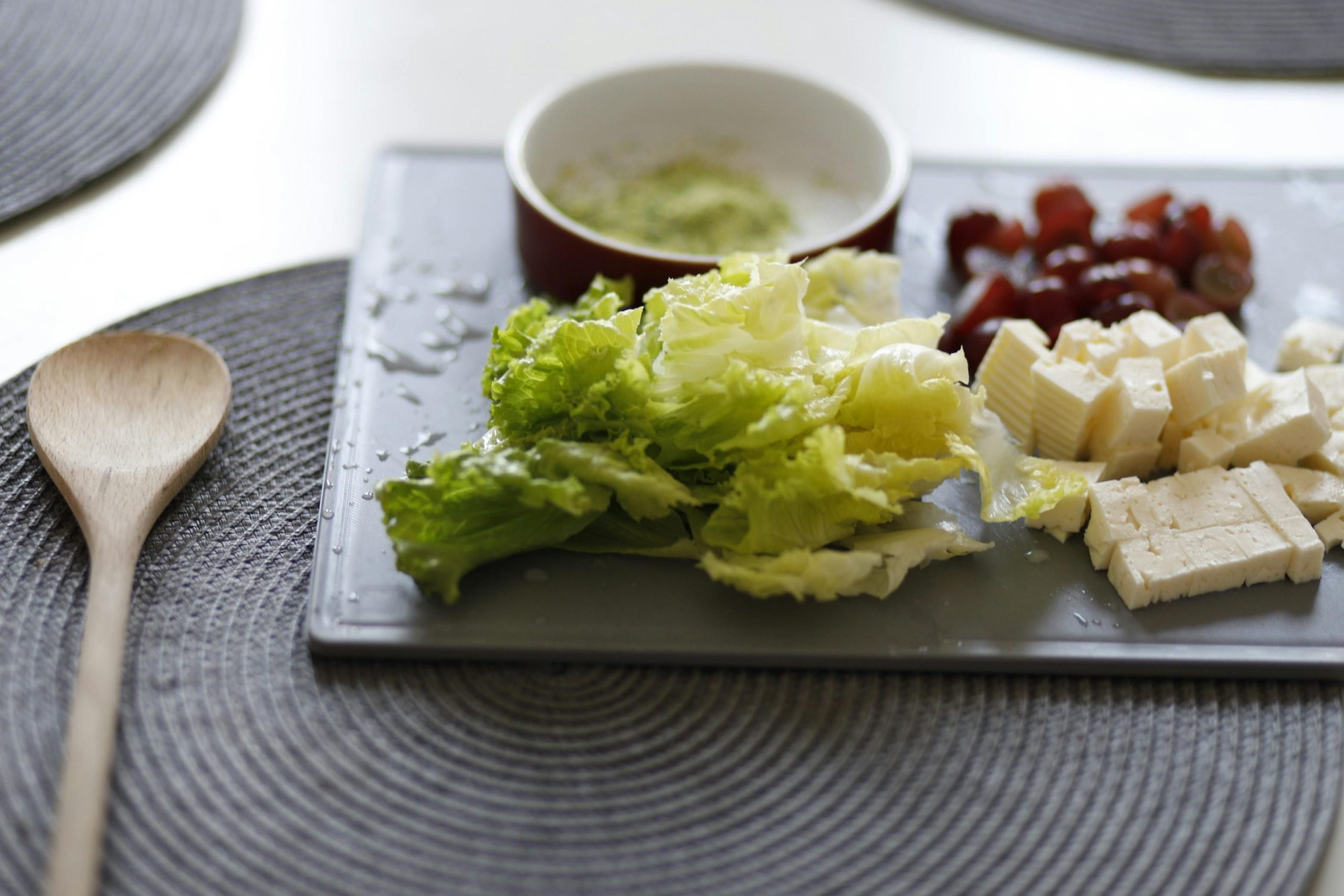Ever wondered what the buzz around raw vegan food is all about?
Finding a diet that is not only healthy but also environmentally friendly and delicious can be challenging.
Raw vegan food consists of plant-based, uncooked ingredients, which preserves nutrients and natural enzymes that are often lost during cooking.
In this comprehensive guide, we’ll dive into what raw vegan food is, explore its benefits and risks, provide practical tips on how to start, and share some mouth-watering recipes to get you started on your raw vegan journey.
What is Raw Vegan Food? An Introduction

Raw vegan food is a specific type of diet that combines the principles of veganism and raw foodism. This means that all food is plant-based and excludes any animal products, such as meat, dairy, and eggs. Additionally, raw vegan food is not heated above 104-118°F (40-48°C). The idea behind this temperature limit is to preserve the natural enzymes and nutrients that are often destroyed during cooking. This diet includes a variety of foods such as:
- Fresh fruits and vegetables
- Nuts and seeds
- Sprouted grains and legumes
- Seaweeds
The raw vegan diet is distinct from other forms of veganism primarily because of its emphasis on uncooked foods. While typical vegan diets allow for cooked plant-based foods, raw veganism maintains that keeping foods raw maximizes their nutritional value. This approach to eating is not just about dieting; it’s a lifestyle choice that focuses on minimal processing of foods to achieve a healthier way of living. By adhering to this diet, individuals often aim to tap into the purest form of nutrients available in their food, believing that this leads to improved health and vitality.
The Benefits of a Raw Vegan Diet
Adopting a raw vegan diet offers a myriad of health benefits that can enhance one’s overall well-being. Increased nutrient intake is a significant advantage, as raw foods are rich in vitamins, minerals, and enzymes that are often diminished through cooking processes. For instance, raw foods maintain higher levels of Vitamin C and B vitamins, which are crucial for energy and immune function. Furthermore, a raw vegan diet is naturally high in fiber and low in unhealthy fats, which helps in promoting better digestive health and can aid in sustainable weight loss without the need to count calories.
Beyond personal health, choosing a raw vegan diet also contributes positively to environmental sustainability. The diet emphasizes the consumption of organic and locally sourced produce, which reduces the carbon footprint associated with long-distance food transportation and extensive processing. This practice not only supports local farmers but also minimizes the use of chemicals and preservatives, promoting a healthier ecosystem. By integrating more raw plant-based foods into one’s diet, individuals can play an active role in reducing environmental degradation and fostering a more sustainable food system, making the raw vegan diet beneficial not just for personal health but for the planet as well.
Understanding the Risks of a Raw Vegan Diet
While the raw vegan diet boasts numerous health benefits, it’s crucial to be aware of its potential risks, particularly nutritional deficiencies. The diet’s strict regimen of uncooked, plant-based foods often lacks essential nutrients such as vitamin B12, calcium, and vitamin D, which are crucial for blood health, bone strength, and overall vitality. These deficiencies can lead to serious health issues like anemia, weakened bones, and a compromised immune system. It’s important for those considering this diet to plan meticulously and consider supplementation to fill nutritional gaps.
Another challenge of the raw vegan diet is the potential for protein deficiency. Raw vegan foods generally contain less protein compared to cooked or animal-based products. Since protein is vital for muscle repair, hormone production, and overall health, its scarcity can lead to muscle weakness and other health complications. Moreover, the diet’s heavy reliance on specific raw foods can also lead to an unbalanced intake of other important nutrients and minerals, posing further health risks. Understanding these challenges is essential for anyone considering adopting a raw vegan lifestyle to ensure they maintain a balanced and healthy diet.
How to Start a Raw Vegan Diet Successfully

Transitioning to a raw vegan diet can be an exciting journey towards better health and environmental consciousness. To start successfully, it’s crucial to gradually introduce raw vegan foods into your diet. Begin by incorporating raw fruits, vegetables, and nuts into your meals. This gradual shift helps your body adjust to the new diet without overwhelming it, making the transition smoother and more sustainable.
Planning is key when shifting to a raw vegan diet. Prepare a weekly meal plan that includes a variety of raw vegan foods to ensure you receive a balanced intake of nutrients. Utilize online resources or raw vegan cookbooks for meal ideas and recipes. Remember, a well-thought-out plan not only helps in maintaining nutritional balance but also makes grocery shopping more efficient and reduces food waste.
Engage with the raw vegan community online or locally. Connecting with like-minded individuals can provide support, motivation, and new ideas. Many communities offer workshops, potlucks, and other events where you can learn more and share experiences. This network can be invaluable, especially in the early stages of your transition to a raw vegan diet.
Sample Raw Vegan Meal Plan
A typical day on a raw vegan diet might start with a breakfast of chia pudding topped with fresh berries and a sprinkle of nuts. For lunch, a large salad with mixed greens, sprouts, avocado, and a dressing of cold-pressed olive oil and lemon juice. Snacks can include raw nuts or fresh fruit to keep energy levels up.
Dinner could be zucchini noodles tossed in a pesto made from basil, pine nuts, and nutritional yeast. For dessert, indulge in a raw vegan key lime pie made from avocados, lime juice, and a crust of dates and almonds. This sample meal plan not only satisfies the palate but also provides a wide range of nutrients necessary for a healthy raw vegan diet.
Essential Raw Vegan Food List
Essential foods for a raw vegan diet include a variety of fresh and dried fruits, such as apples, berries, and dates; raw vegetables like kale, carrots, and bell peppers; and raw nuts and seeds, such as almonds, chia seeds, and flaxseeds. Include sprouted grains and legumes like quinoa and lentils, which are rich in proteins and nutrients.
Foods to avoid on a raw vegan diet are crucial for maintaining its integrity. Steer clear of cooked foods, including cooked grains, beans, and roasted nuts. Processed foods like chips, cookies, and pasteurized juices should also be avoided. Lastly, traditional dairy products and refined sugars are not part of a raw vegan diet, as they counteract the diet’s health benefits.
Delicious Raw Vegan Recipes to Try
If you’re eager to dive into the world of raw vegan food, starting with some simple and delicious recipes is a great way to begin. One popular choice is the raw vegan pad thai, made with zucchini noodles for a fresh and light twist on the traditional dish. The zucchini is spiralized into thin strands and tossed with a homemade sauce of tamarind, maple syrup, and almond butter, creating a delightful blend of sweet and savory flavors. For added texture and nutrition, you can top the dish with crushed peanuts or sunflower seeds, and a generous handful of fresh cilantro.
For those with a sweet tooth, trying out a raw vegan granola bar can be a satisfying treat. These bars are packed with natural ingredients like dates, coconut, and raw nuts, all bound together with a touch of maple syrup for natural sweetness. Here’s a simple way to prepare them:
- Blend dates and a choice of nut butter (like raw almond butter) to form a sticky base.
- Mix in chopped nuts, seeds (such as sunflower seeds), and shredded coconut for crunch.
- Press the mixture into a pan, chill until set, and then cut into bars.
These granola bars make a perfect snack for on-the-go energy or a quick breakfast option.
Discover Raw Vegan Delights with Indulge‘s Culinary Tours
If you’re intrigued by the world of raw vegan cuisine, INDULGE offers an exceptional opportunity to dive deep into this healthy and sustainable way of eating through their curated culinary tours. These tours are not just about tasting food; they’re educational experiences that connect you with the roots of raw vegan ingredients and their preparation. By participating, you’ll explore Zurich’s vibrant food scene, focusing on plant-based delights that are as nourishing as they are delicious. You’ll get to:
- Learn directly from expert chefs who specialize in raw vegan dishes
- Discover unique ingredients at local markets
- Understand the nutritional benefits of raw vegan foods
The tours provided by INDULGE are designed to enhance your culinary knowledge and appreciation, making them a perfect fit for anyone looking to transition to or explore a raw vegan diet further. Whether you’re a seasoned vegan or just curious about incorporating more plant-based foods into your diet, these tours offer a hands-on approach to learning and eating. What’s more, you’ll be able to enjoy a range of dishes that showcase the versatility of raw vegan cooking. Ready to embark on this flavorful journey? Visit INDULGE’s culinary tour page to book your tour and experience the raw vegan delights of Zurich firsthand.
Frequently Asked Questions
What foods can raw vegans eat?
Raw vegans can eat a variety of uncooked plant-based foods. These include fresh and dried fruits like apples, berries, and dates; raw vegetables such as kale, carrots, and bell peppers; raw nuts and seeds like almonds, chia seeds, and flaxseeds; and sprouted grains and legumes such as quinoa and lentils. They should avoid cooked foods, processed foods, traditional dairy products, and refined sugars.
Is raw vegan actually healthy?
Adopting a raw vegan diet can offer numerous health benefits, including increased nutrient intake, promotion of better digestive health, and aiding in sustainable weight loss. However, it’s important to be aware of potential nutritional deficiencies such as vitamin B12, calcium, and vitamin D, which can lead to serious health issues. Therefore, meticulous planning and consideration of supplementation are crucial.
What is raw food vegan lifestyle?
The raw food vegan lifestyle is a diet that combines the principles of veganism and raw foodism, emphasizing the consumption of plant-based foods that are not cooked above 104-118°F to preserve natural enzymes and nutrients. This lifestyle focuses on minimal processing of foods, aiming for a healthier way of living by tapping into the purest form of nutrients available in food.
How to start eating raw vegan?
To start a raw vegan diet, it’s recommended to gradually introduce raw vegan foods into your diet, such as raw fruits, vegetables, and nuts. Planning is crucial; prepare a weekly meal plan that includes a variety of raw vegan foods to ensure a balanced nutrient intake. It’s also beneficial to engage with the raw vegan community for support and ideas. Utilizing online resources or raw vegan cookbooks for meal ideas and recipes can further aid in the transition.







